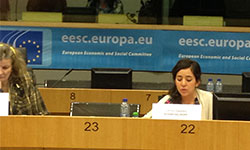BusinessEurope Headlines No. 2016-11
TTIP on trial
 BusinessEurope was part of an innovative discussion on the Transatlantic Trade and Investment Partnership in the format of a trial, with two sides defending the pros and cons of the agreement. Organised by European Movement International on 17 March, the discussions focused on the regulatory part, investment protection and the benefits of TTIP for the society at large. BusinessEurope reiterated that TTIP aims to improve the regulatory environment for companies doing business across the Atlantic and not to deregulate or reduce the level of
BusinessEurope was part of an innovative discussion on the Transatlantic Trade and Investment Partnership in the format of a trial, with two sides defending the pros and cons of the agreement. Organised by European Movement International on 17 March, the discussions focused on the regulatory part, investment protection and the benefits of TTIP for the society at large. BusinessEurope reiterated that TTIP aims to improve the regulatory environment for companies doing business across the Atlantic and not to deregulate or reduce the level of  standards. TTIP is an agreement that will benefit SMEs in particular, be it through the elimination of tariffs – still as high as 20% in many sectors –, the protection of geographical indications or the elimination of unnecessary administrative burdens. TTIP is also an opportunity for the EU and the USA to shape global rules according to high standards; this will translate into concrete benefits for EU citizens.
standards. TTIP is an agreement that will benefit SMEs in particular, be it through the elimination of tariffs – still as high as 20% in many sectors –, the protection of geographical indications or the elimination of unnecessary administrative burdens. TTIP is also an opportunity for the EU and the USA to shape global rules according to high standards; this will translate into concrete benefits for EU citizens.
Contact: Luisa Santos
EU-Russia business communication channels must be kept open
 It is important that channels of communication between businesses in the EU and in Russia are kept open. At a meeting on 17 March, BusinessEurope had the opportunity to discuss with representatives of the Association of European Businesses (AEB) in Russia about recent developments and the current economic situation in the country, which remains challenging not only due to sanctions but also to low oil prices and depreciation of the rouble. In this regard, structural reforms are required in the Russian economy to encourage diversification away from traditional resource-holding sectors. BusinessEurope and the AEB also shared their concerns about the continuous protectionist trend followed by Russia in a number of areas, such as public procurement.
It is important that channels of communication between businesses in the EU and in Russia are kept open. At a meeting on 17 March, BusinessEurope had the opportunity to discuss with representatives of the Association of European Businesses (AEB) in Russia about recent developments and the current economic situation in the country, which remains challenging not only due to sanctions but also to low oil prices and depreciation of the rouble. In this regard, structural reforms are required in the Russian economy to encourage diversification away from traditional resource-holding sectors. BusinessEurope and the AEB also shared their concerns about the continuous protectionist trend followed by Russia in a number of areas, such as public procurement.
Contact: Sofia Bournou
Growth is necessary to tackle poverty and social exclusion
 "The way to tackle poverty and social exclusion is to get more people back into work", BusinessEurope Senior Adviser Rebekah Smith highlighted on 21 March, speaking on the concluding panel at the annual EU convention on inclusive growth. Welfare systems need to provide sufficient resources for those who are not able to work, in a targeted way. But at the same time, they must be designed to facilitate entry or return to the labour market. And work must pay compared to social benefits. Commenting on the European Commission’s proposal for a European pillar of social rights, she highlighted that this could be useful for benchmarking between member states, as long as it stimulates countries to reform. (Photo copyright: The European Union)
"The way to tackle poverty and social exclusion is to get more people back into work", BusinessEurope Senior Adviser Rebekah Smith highlighted on 21 March, speaking on the concluding panel at the annual EU convention on inclusive growth. Welfare systems need to provide sufficient resources for those who are not able to work, in a targeted way. But at the same time, they must be designed to facilitate entry or return to the labour market. And work must pay compared to social benefits. Commenting on the European Commission’s proposal for a European pillar of social rights, she highlighted that this could be useful for benchmarking between member states, as long as it stimulates countries to reform. (Photo copyright: The European Union)
Contact: Rebekah Smith
Designing a truly effective EU single digital gateway for the single market
 "The future single digital gateway will need to include mandatory quality standards for member states", BusinessEurope’s Director of Entrepreneurship and SMEs Daniel Cloquet said at a European Commission workshop on 15 March. The gateway, as DG GROW explained at the workshop, would be based on the interconnection and integration of the "Your Europe" portal and of various member state-managed portals – the "points of single contact" for services (PSCs), the "product contact points", etc. Daniel Cloquet underlined that many of these national portals do not have an acceptable level of quality, in terms of neither the information supplied nor the online assistance provided for completing national administrative procedures. This is a major problem for cross-border expansion of SMEs. A PSC quality charter was agreed in 2013, defining up-to-date performance standards for information and assistance provision. But adoption of the charter is optional for member states, and few of them have adopted it. Daniel Cloquet insisted that future governance of the single digital gateway needs to include mandatory quality standards and quality reporting procedures for member states' portals.
"The future single digital gateway will need to include mandatory quality standards for member states", BusinessEurope’s Director of Entrepreneurship and SMEs Daniel Cloquet said at a European Commission workshop on 15 March. The gateway, as DG GROW explained at the workshop, would be based on the interconnection and integration of the "Your Europe" portal and of various member state-managed portals – the "points of single contact" for services (PSCs), the "product contact points", etc. Daniel Cloquet underlined that many of these national portals do not have an acceptable level of quality, in terms of neither the information supplied nor the online assistance provided for completing national administrative procedures. This is a major problem for cross-border expansion of SMEs. A PSC quality charter was agreed in 2013, defining up-to-date performance standards for information and assistance provision. But adoption of the charter is optional for member states, and few of them have adopted it. Daniel Cloquet insisted that future governance of the single digital gateway needs to include mandatory quality standards and quality reporting procedures for member states' portals.
Contact: Daniel Cloquet
Big data: European Commission must assess existing rules before introducing new legislation
 Innovations based on the use of machine (non-personal) data, such as the Internet of Things, self-driven cars and smart factories are at an early stage of development. Each sector has its specific instruments and needs regarding the collection and use of data. There is no one-size-fits-all approach when it comes to define rules on data ownership and liabilities. This was the message that Cecilia Zappalà, BusinessEurope Adviser for the digital economy, delivered to the European Commission during a roundtable on "a legal regime for efficient and fair access and usage of data" on 17 March 2016 in Luxembourg. The regime for exchanges of machine data is often managed by contractual arrangements between companies. Before additional regulatory provisions are introduced, it should be established that a specific problem cannot be addressed under the current regimes, particularly the existing contractual means.
Innovations based on the use of machine (non-personal) data, such as the Internet of Things, self-driven cars and smart factories are at an early stage of development. Each sector has its specific instruments and needs regarding the collection and use of data. There is no one-size-fits-all approach when it comes to define rules on data ownership and liabilities. This was the message that Cecilia Zappalà, BusinessEurope Adviser for the digital economy, delivered to the European Commission during a roundtable on "a legal regime for efficient and fair access and usage of data" on 17 March 2016 in Luxembourg. The regime for exchanges of machine data is often managed by contractual arrangements between companies. Before additional regulatory provisions are introduced, it should be established that a specific problem cannot be addressed under the current regimes, particularly the existing contractual means.
Contact: Cecilia Zappalà
Waste legislation discussed with Members of the European Parliament
 The adoption of a new harmonised calculation method for waste treatment and recycling process in Europe must be a priority of the waste legislative proposals. Its concrete impact on member state ability to reach recycling targets should be thoroughly assessed. This was one of the key messages by BusinessEurope at the stakeholder meeting on waste legislation organised in the European Parliament on 21 March. Industry and business representatives had been invited to a preliminary exchange of views on the waste legislative proposals with Members of the European Parliament and the shadow rapporteur Pavel Telicka. BusinessEurope has started assessing the legislative proposals within its newly set-up Waste Task Force, chaired by Alexander Kessler of the German Confederation of Industry BDI. "The current lack of reliable data in all EU member states prevents comparison, which is a pre-requisite to monitor improvements and to develop meaningful policy approaches", Kessler underlined.
The adoption of a new harmonised calculation method for waste treatment and recycling process in Europe must be a priority of the waste legislative proposals. Its concrete impact on member state ability to reach recycling targets should be thoroughly assessed. This was one of the key messages by BusinessEurope at the stakeholder meeting on waste legislation organised in the European Parliament on 21 March. Industry and business representatives had been invited to a preliminary exchange of views on the waste legislative proposals with Members of the European Parliament and the shadow rapporteur Pavel Telicka. BusinessEurope has started assessing the legislative proposals within its newly set-up Waste Task Force, chaired by Alexander Kessler of the German Confederation of Industry BDI. "The current lack of reliable data in all EU member states prevents comparison, which is a pre-requisite to monitor improvements and to develop meaningful policy approaches", Kessler underlined.
Contact: Valentina Spina
EU-US Privacy Shield can provide a reliable framework for transatlantic data transfers
 The ability to transfer data across borders is a key priority for BusinessEurope. This is a horizontal business issue, affecting companies of any dimension, in all sectors and all countries. It is fundamental that the national data protection authorities and the European Commission maintain a consistent European approach in applying the "Privacy Shield". BusinessEurope calls on national data protection authorities to give a positive assessment to the new framework, to ensure legal certainty and restore trust in EU-US relations. These were the messages Cecilia Zappalà raised during an open discussion on Privacy Shield at the European Economic and Social Committee on 21 March 2016. Representatives from the European Commission, consumers, industry and the European Data Protection Supervisor also participated in the discussion.
The ability to transfer data across borders is a key priority for BusinessEurope. This is a horizontal business issue, affecting companies of any dimension, in all sectors and all countries. It is fundamental that the national data protection authorities and the European Commission maintain a consistent European approach in applying the "Privacy Shield". BusinessEurope calls on national data protection authorities to give a positive assessment to the new framework, to ensure legal certainty and restore trust in EU-US relations. These were the messages Cecilia Zappalà raised during an open discussion on Privacy Shield at the European Economic and Social Committee on 21 March 2016. Representatives from the European Commission, consumers, industry and the European Data Protection Supervisor also participated in the discussion.
Contact: Cecilia Zappalà
Calendar
 31 March-1 April: "Innovative Enterprise", The Hague
31 March-1 April: "Innovative Enterprise", The Hague- 1 April: SME Envoy Network meeting, Amsterdam
- 4-5 April: Open Science conference, Amsterdam
- 4-5 April: high-level meeting on the circular economy, Amsterdam
- 4-7 April: EU Youth conference "Ready for life, ready for society"
- 6 April: European Commission's DSM technologies and public services modernisation package
- 6 April: European Commission's "smart borders" proposal
- 7 April: your next edition of Headlines - Happy Easter to all our readers!